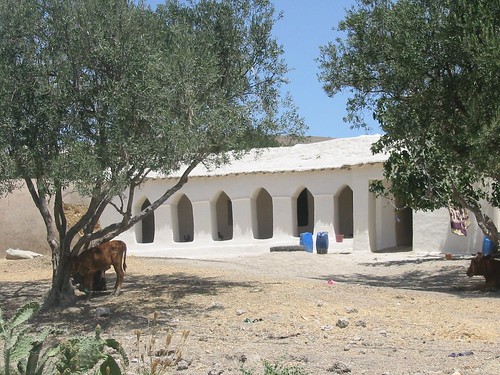Yes.
A violin.

Made with a can of weedkiller - so Ouled Emgatel.

Look at the details – the bridge.
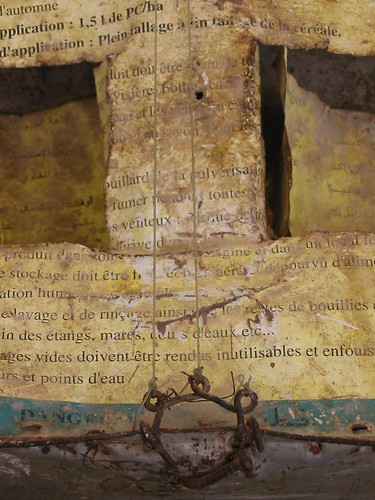
Its bow was lost years ago.
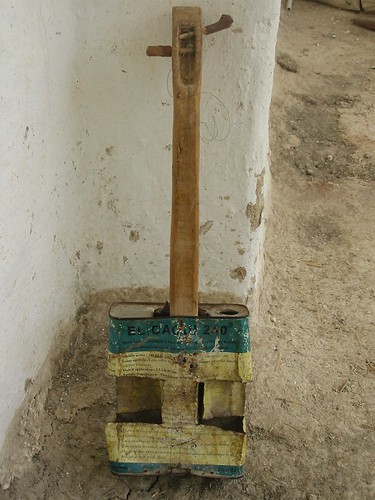
But the violin stayed.
That’s an everyday dish, that can be found in Moroccan homes as well as in many small restaurants.
And, as are often very simple things, it’s delicious.
The important thing is to use a lot of olive oil. It’s a Moroccan thing. On the photo I took, there is obviously to little of it... shame on me !
The other important thing is to eat those eggs with good Moroccan bread. But you could use another type of good bread.
Let’s do this :
Pour some olive oil in a skillet (a lot, remember?). When it’s hot enough, add the eggs, as many as you want. Let cook for a few second, and stop the fire as soon as the eggs are cooked enough for you.
Season with salt and ground cumin.
Simple, I said .
In the small restaurants inFez, those eggs only cost a few dirhams... a treat, with a side of salad and a nice lentil tajine !
Watching the herd all morning can get boring.
So, they made this.
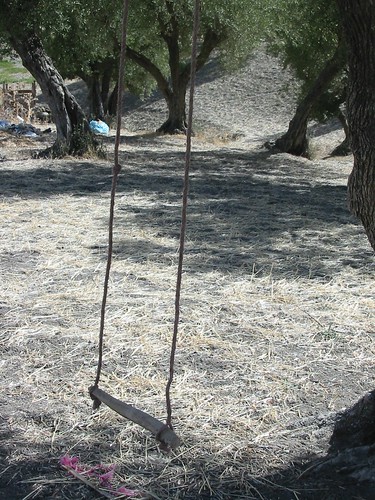
For a few months, since the end of the harvest, and that the fields are no longer off-limits to the animals, Smain and Houria have been spending their morning on our land, with their herds. They come early, at 7AM – which, given the, huh, jet-lag, are really 6AM for them -, and leave before the sun gets too hot, at around 11.
Houria is our neighbors’ daughter, and has to take care of a dozen of cows. Smain’s herd is much smaller since he only has… one cow.
This cow is very important.
Smain is Bachir’s younger brother. Bachir is the keeper of our house, and also often a worker. Their family is poor. I mean, most people in the area could be considered as poor, according to European standards. The reality is that a lot of people here are doing fine. That is, when they have a piece of land, which means wheat, hay, and maybe a few olive trees. When they have big farms, and tractors.
But Bachir’s family have none of this. In that case, men just wait for a job in somebody else’s fields, and sometimes, there is no work at all – and in Bachir’s family, “men” means himself, he’s 18,and his older brother, who spend a lot of time in Casablanca, trying to earn more money; their father is very old, and can’t work a lot.
Thanks to some microcredit, Bachir was able to loan the few thousands dirhams he needed to buy a cow. And a cow, as I said, is important. It means milk, whey, butter. It means that the family is getting richer, because of Bachir’s hard work.
With only one cow to watch, Smain’s job is much easier than Houria’s.
Actually, none of them is stressed out because of the job. They play with Houria’s little cousins, in the shade of our house.(link). They chat for hours. They fall asleep in the field – and then I understand why our reeds have been eaten…
And sometimes, they make a swing.
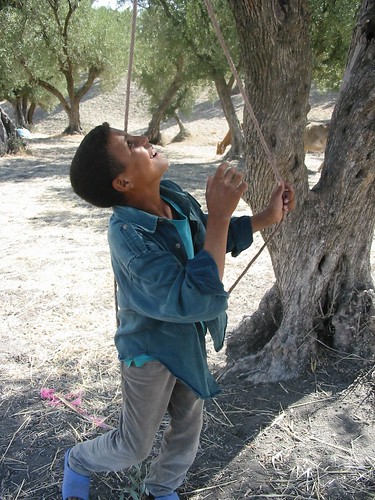
Climbing in the tree was a lot of fun too…

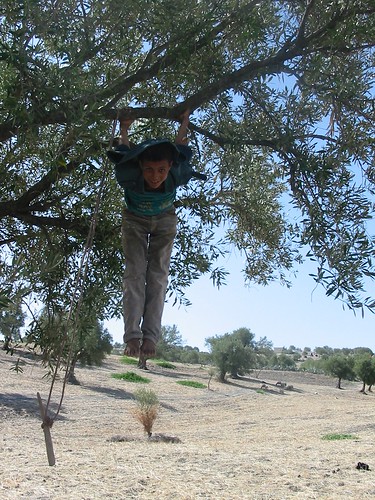
Recently I discovered that our house is in a different time-zone than the rest of Ouled Mgatel.
Yes.
When it’s 9 in our house (and I think it works for the garden as well…), it’s actually 8 at our neighbors’, and probably in the whole area of Ouled Jamaa.
Now, that explains a lot…. I thought everybody was just late.
But no, they didn’t switch to daylight-saving time, as did the rest of Morocco in last May.
And after all, why would they change ? They don’t have trains to catch, or jobs in the city. They’ve always lived with the sun. Their time is as good as the one used elsewhere.
And I like the idea that I am always one hour early… at least in Ouled Mgatel !
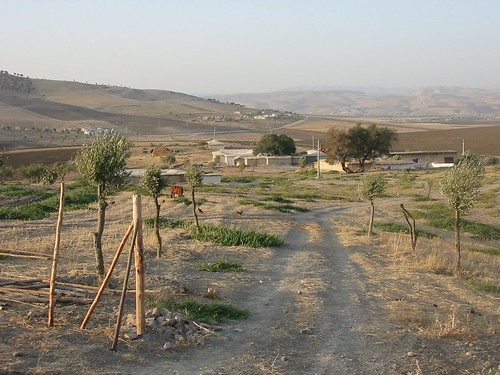
walk these 150 meters, and experience time-travelling…
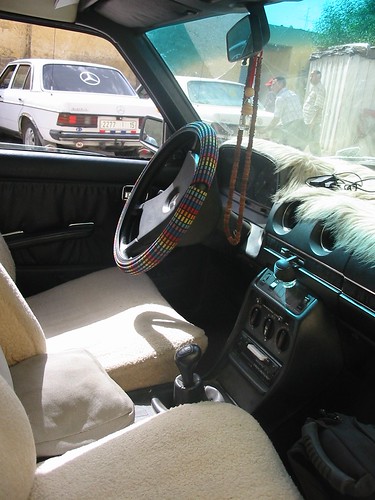
Fur by the windshield ? Check.
Funky steering wheel ? Check.
Muslim rosary ? Check.
4 passengers squeezed in the rear, and two that will have to sit on the passenger seat (us, obviously). Check.
Now… what’s missing in this picturesque but standard Moroccan “grand taxi”? Ah yes, the crazy driver. Well, not this time – the guy obviously loved his car and didn’t want it to get into an accident. Good man. Lucky for us.
Really.
I hate taking those taxis ! Won’t happen before a long time, I hope –and it definitely won’t, because... we’ve bought a car !!! Yes !

Fred is waving at a "Grand Taxi"... and of course, as usual, the dog Lisa couldn't stand to see us leave and decided to walk the three kilometers from our house to the main road.
If you want to know how difficult it is to go to Fez when you don’t have a car and live in Ouled Mgatel… read the post I wrote in May, when that first happened to us.
When we adopted our cats, we were hoping that they would eat a lot.
Of mice.
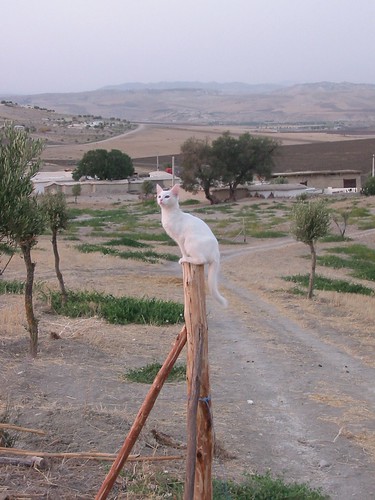
Four months later, I must say that they’ve come a long way since the dry cat food they ate in their first home (a nice house by the way, you can visit it here), until their plates of Ouled Mgatel.
Because here’s our secret – shocking, maybe, to American ears – we don’t feed our cats meat. Or any kind of canned/dry cat food. They eat a of eggs, and whatever food is left from our meals – including, sometimes, vegetables : and they like it !
Don’t worry though, they eat a lot of proteins, that they find both in the house and in the garden. They swallow flies and ants. Hunt mice – but they’re more difficult to catch. Scare to death spiders and wasps. Choke sometimes swallowing some delicious earwigs.
Some people may find this disguting. But I say : it’s useful. Much better than insecticide.
And also : they protect us.
The other morning, I found at the bottom of the stairs a big scolopendra. Dead. Killed – and a little chewed – by our brave protectors.
Since that day, I respect my cats. And if you knew the scolopendras that live here, you’d admire cats too.
Let’s say that scolopendras are as charming as scorpions, except that they’re bigger – no, longer. They’re black, with yellow legs, disgusting. They run really fast, and they’re difficult to kill (bravo, cats). And last but not least, they bite, like wasps.
Sorry, I don’t have any photo of scolopendras, they scare me too much.
But if you really want to know what they look like, take a peek here – don’t be scared !- on this wonderful website on Moroccan animals and plants (it's a the bottom of the page, on the right).
They ate all my melons… vandalized the garden… they wander around the house, clucking war songs… trample the sand in our ponds… showing their creepy faces in the fields…
And then they decided to sit on the bench, in the courtyard.
Where will I find them next time ? In my bedroom ? Rummaging through my stuff, or taking a bath in our bathroom ?
They gather under the olive tree to establish their plan of attack. A piece of advice for you : don’t look at them in the eyes.
A mudbrick house, it sounds simple. At least here, in the north of Fez, where peasants build small whitewashed houses. In general, they are made of several rectangular rooms, that don’t directly communicate, but through the patio around which they are laid out.
Life in a Moroccan house – at least in the countryside – is very different from life in a European house.The same room is used as a living room, a bedroom, or a dining room, depending on the time of day. There is one room for the guests ; another for the girls of the family ; and another for the boys and unmarried men. When a man gets married, he build a new room, where he’ll move in with his wife. It’s different for the girls of course, since they leave their family when they get married, and settle for their whole life in the house of their husband – often only a few kilometers away from their parents’ house.
Our neighbors' house: a few rooms laid out around the patio, a sloping roof... surrounded by olives trees and prickly pear cactuses
Sometimes, houses have two floors ; it’s a little more sophisticated. Sloping roofs are the norm here, although plain, flat roofs can also be seen in the area.
But much more complicated buildings are be made with earth. For example, look at the Djenna Mosque, in Mali, here and here. Impressive, isn’t it ?
When we built our house, we stayed simple. Of course, the shape of some rooms – such as the kitchen – is different from what can be seen in the area. We wanted a house more confortable, more « Western », than that of our neighbors. The adjoining rooms communicate ; there is a terrace on the second floor, book shelves hollowed ouf of the walls, and a real bathroom. In the future, we really want to be more inventive because, when you build with mud bricks, or straw bales, the possibilities are endless. You just have to try !
We saw this beautiful house on the road that leads to the north of the country, about twenty kilometers from Ouled Mgatel. We will definitely have those arcades in mind when we’ll begin the construction of our next room.
